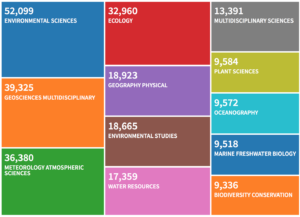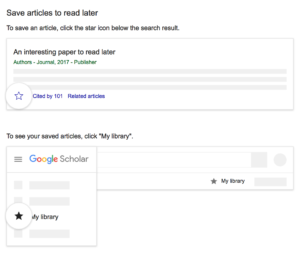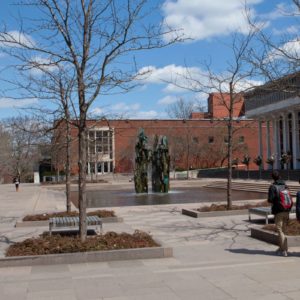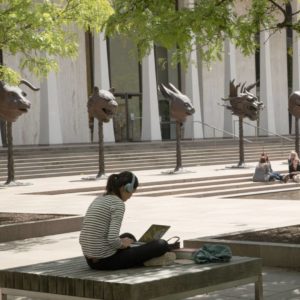As the simultaneously dreaded and much-awaited Dean’s Date comes around again, many of us find ourselves writing final research papers for our foreign language classes. Conducting research and writing a long paper in a language in which we are not fully fluent is both harder and very different from writing one in our native language. Personally, I have spent the past few days writing a paper for French 307 discussing the ethics of weapons development, a fairly technical subject which presented a number of challenges.
Finding Online Sources
With Dean’s date looming, it is likely that many of you (like me) are about to get a late start on your term papers. In my experience, the success of a project and the effectiveness of my thesis rests largely on my understanding of past research and the foundational theories concerning the topic. The first steps I take in a research project are to explore the literature surrounding a topic and to begin to put together a library of sources. However, when searching for online sources, it can be hard to know where to start looking, how to identify important and reputable sources, and how to keep your searches organized. Luckily, there are many tools that can help you streamline your search and get writing faster! If you are struggling, here is a basic framework you can use to search better:
Use Web of Science to Guide your Search
Web of Science is a human-curated database, which generally includes only reputable journal articles. It links every article to those that it cited and those that cited it, creating the eponymous ‘web’ that you can easily traverse in search of important or fundamental sources. Web of Science’s detailed statistics on article citations and journal impact allow you to more easily ascertain the relative importance of an article. It has highly customizable search options and even provides links to the full-text through Princeton University Library and Google Scholar.

While Web of Science is a powerful tool, it has some draw-backs. You need to be connected through the Princeton network to access the site, it doesn’t include all journals from every discipline, and cannot search within the main text of articles for keywords. For that reason, I usually supplement my search with Google Scholar after forming a basis of reputable articles from Web of Science. Google Scholar allows for in-text keyword search and includes many mediums in addition to journal articles, but it is not a human-curated database, and search results will include many sources that are unreputable or low quality.
Build a Library of Sources With Google Scholar:
I have often found myself lost in a sea of open tabs or forgetting where I found a promising article. Keeping my search organized is always a struggle, but with Google Scholar’s library feature, it is extremely simple. If you find an interesting article, simply click the star on the lower left hand side of the search result. The article link will be saved to your personal library along with its citation information. You can easily organize your library by assigning labels to different topics or projects and editing citation information. As your topic narrows and you begin to form a thesis, your library will evolve. Using Google Scholar Library is great because you can easily add, delete, and organize your library without having to download PDF documents or external apps. When you’re ready to cite your sources, Google Scholar creates citations for you and allows you to export citation files in many different formats.

Using this basic framework for online source searching can help you find useful and reputable articles while saving you time and keeping your sources organized. If you are struggling to find articles for your discipline on Web of Science, Scopus is an awesome alternative which is very similar but has a different format and has a slightly different selection of articles. For even more specialized databases, you can always check out the Library’s website. In addition, for those who prefer to save their library on their computer and not store it online, applications like Mendeley or Zotero have great tools for downloading and organizing PDF sources and automating citations.
–Alec Getraer, Natural Sciences Correspondent
How to Approach a Politics Paper

This week, I’m working on a paper for Human Rights, a politics class that I’m taking.This course only has one major paper assignment, and it’s very broad. Given that this is a tricky, but not entirely uncommon situation, I thought I’d share my approach to writing this paper. It’s often said that “writing is thinking,” so why not write about thinking about writing?
I started thinking about the paper pretty early in the course. To be fair, this wasn’t all me—my preceptor gently encouraged us to have a topic in mind before Spring Break. The best thing about brainstorming topics early is that you have the time and latitude to allow your idea to evolve. And evolve my idea did. Continue reading How to Approach a Politics Paper
Visualizing Your Argument
The blank page at the very beginning of the writing process is one of the most difficult stages for me. I struggle with how to get started and feel overwhelmed by the amount of work ahead of me.
To avoid this blank page, I open a Word Document called “Notes” early on in the research process. As I sort through the ever-accumulating pile of books and articles on my desk, I copy the relevant quotes into the document, followed by the author’s name and the page number. Typically, only a fraction of these quotes actually make it into the paper, so it can be hard to know when to stop. The metric I’ve figured out is: when the notes document is double the length of the assignment, I know it’s time to begin drafting the paper.

As I write, this document becomes my primary resource for information and direct quotes. Because it’s consolidated in one file, it’s easily navigable and searchable. Sometimes, I reorganize the quotes into sections to guide my paragraph structure and overall argument.
In the past, this system has worked well for me. But in the past few weeks, two of my teachers have modeled an exciting new approach to organizing research materials: visual mapping. Continue reading Visualizing Your Argument
GEO/WRI 201: The Best Course on Scientific Research and Writing Offered at Princeton
“Any science major should consider this course…it is basically independent work guided by two top notch professors and supported by an entire seminar class.” – Anonymous Student Review
Every undergraduate studying the natural sciences at Princeton undertakes significant independent research projects in their Junior and Senior years. GEO/WRI 201: Methods in Data Analysis & Scientific Writing is a unique course designed specifically to teach students how to write an independent scientific paper. If you are a Sophomore or Junior looking to attain the concrete skills and confidence to tackle independent research, there is no better class to take.
In 201, you will learn how to design, research, write, and present original scientific research, all through the lens of measuring changing landscapes using satellite and drone-derived aerial imagery. Under the mentorship of Adam Maloof (GEO) and Amanda Irwin Wilkins (WRI), and with the support of your peers, you will: develop an original, well motivated scientific question; design effective field methods to test a specific hypothesis; quantitatively analyze data and imagery; and learn how to effectively communicate the results in a scientific paper and slideshow presentation. The highlight of the class is a nine day field trip across Utah, where students work collaboratively to implement their own field methods, piloting drones and collecting climatological data.

Why Do We Research?

If you are reading this post, you are likely involved in research. Unsurprisingly, I am too. Yes, I’ve spent my fair share of long nights on the A floor of Firestone, reviewing sources and tightening up arguments. This week, I’m embarking on a new history research paper about the evolution of Native American spirituality from the 1830s to the 1890s, which I anticipate will take a fair amount of time. Reflecting on the work I have ahead got me thinking, why am I doing this in the first place? In fact, why do any of us research?
This question can really be broken into two parts: “What do we hope to achieve from our research?” and “What motivates us to conduct our research?” We think about the first question often, because in the academy, we have to justify what we’re doing to our professors, to funding boards, etc. And in lots of research, one’s answer to the first question informs their answer to the second. Certain biologist friends of mine, for instance, study lab rat carcasses in the hopes of better understanding tumors, with the inspiring goal of curing cancer. In cases such as this, the aim of a project is to arrive at something with a concrete application so marvelous that it motivates the researcher to come to the lab each morning.
Continue reading Why Do We Research?
How to Take a Productive Break

Every exam period, I find myself starting to withdraw from any non-mandatory activities or commitments. While this may seem like a good idea—after all, I need to make time to study in my already full schedule—it has oftentimes proven to be counterproductive. While I do get time back from skipping other activities, more often than not, I actually squander most of that time being stressed instead of using it in a productive way. This is the result of a combination of incorrect assumptions on my part. Continue reading How to Take a Productive Break
How to Write a History Research Paper

In my last post, I shared some tips on how to conduct research in history and emphasized that researchers should keep in mind a source’s category (transcript, court document, speech, etc.). This post is something of a sequel to that, as I will share some thoughts on what often follows primary-source research: a history research paper. Continue reading How to Write a History Research Paper
Unconventional Research: World Building in Creative Writing
When one thinks about research, there are certain images that come to mind: a student hunched over an old book in an empty library, or a solitary scientist in a lab coat mixing chemicals or observing animals. Emily McLean ’20 has done her fair share of the first type, as a potential Anthropology major with a strong interest in American History.
Emily is also my suitemate, and one day I heard her talking about an unfamiliar, unexpected genre of research: the research required for successful world building–the creation of a believable reality–in creative writing. Continue reading Unconventional Research: World Building in Creative Writing
Independent Work Workshops at the Writing Center

Want an organized JP or Senior thesis? Doing a quantitative research project? Want funding to support your great ideas? Sign up for the workshops below!
— This week —
Continue reading Independent Work Workshops at the Writing Center

